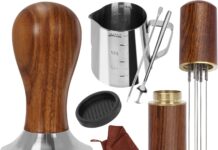Are you a coffee lover who enjoys customizing their cup of joe? Look no further! In our article, we will explore an array of coffee sweeteners that cater to every taste preference out there. From classic favorites like sugar and honey to trendy alternatives like coconut sugar and stevia, we’ve got you covered. Whether you crave a rich and indulgent sweetness or are looking to cut back on calories, there’s a perfect coffee sweetener waiting for you to discover. So sit back, relax, and get ready to enhance your coffee experience with these delectable options.
Different Types of Coffee Sweeteners
When it comes to sweetening our coffee, we have a wide range of options to choose from. From traditional sugar to artificial sweeteners, natural sweeteners, and alternative sweeteners, there is something to suit every taste and dietary preference. In this article, we will explore the different types of coffee sweeteners available, discuss their pros and cons, and provide tips and recipes for creating flavorful coffee sweetener mixes.
Sugar
Sugar is perhaps the most common and widely used sweetener in coffee. It adds a subtle sweetness that enhances the flavor of the coffee without overpowering it. There are several types of sugar available, each with its own unique characteristics.
White Sugar
White sugar, also known as granulated sugar or table sugar, is the most common type of sugar used in coffee. It dissolves easily and quickly in hot or cold beverages, making it a convenient choice for most coffee drinkers.
Brown Sugar
Brown sugar is another popular option, especially for those who prefer a richer and deeper flavor in their coffee. It is made by adding molasses to refined white sugar, giving it a distinct caramel-like taste.
Raw Sugar
Raw sugar, also known as turbinado sugar, is a less processed form of sugar that retains some of the natural molasses. It has a slightly coarser texture and a more complex flavor compared to white sugar.
Turbinado Sugar
Turbinado sugar is another type of minimally processed sugar that is often used as a coffee sweetener. It has a light golden color and a mild flavor, making it a great choice for those who prefer a subtle sweetness in their coffee.
Coconut Sugar
Coconut sugar is an increasingly popular alternative to traditional sugar. It is made from the sap of coconut palm flowers and has a rich caramel flavor. It also boasts a lower glycemic index than regular sugar, making it a better option for those watching their blood sugar levels.
Artificial Sweeteners
For those who are looking to reduce their sugar intake or follow a calorie-restricted diet, artificial sweeteners are a popular choice. These sweeteners provide the sweetness of sugar without the added calories.
Sucralose
Sucralose is a zero-calorie artificial sweetener that is commonly used in beverages, including coffee. It has a sweetness level similar to sugar but without the calories. Unlike some other artificial sweeteners, it does not leave a bitter aftertaste.
Aspartame
Aspartame is another commonly used artificial sweetener that is often found in sugar-free coffee sweeteners and flavored syrups. It is calorie-free and provides a sweetness similar to sugar. However, some people may be sensitive to the taste of aspartame or experience a mild aftertaste.
Stevia
Stevia is a natural sweetener derived from the leaves of the stevia plant. It has gained popularity in recent years due to its zero-calorie nature and its perceived naturalness. Stevia sweeteners are available in both liquid and powder form and provide a sweet taste without the added calories.

Natural Sweeteners
For those who prefer to use natural ingredients in their coffee, natural sweeteners offer a great alternative to sugar. These sweeteners are derived from natural sources and often provide additional health benefits.
Honey
Honey is a natural sweetener that has been used for centuries. It adds a distinct floral flavor to coffee and provides natural antioxidants and antibacterial properties. However, it is important to note that honey should not be added to hot coffee as high temperatures can destroy its beneficial enzymes.
Maple Syrup
Maple syrup is a sweetener made from the sap of maple trees. It has a unique flavor profile that pairs well with coffee, adding a hint of richness and earthiness. Maple syrup also contains minerals and antioxidants, making it a healthier alternative to refined sugar.
Agave Nectar
Agave nectar is a sweetener derived from the agave plant, which is also used in the production of tequila. It has a mild, sweet taste that complements coffee well. Agave nectar has a lower glycemic index than sugar, making it a suitable option for those with diabetes or watching their blood sugar levels.
Alternative Sweeteners
In addition to traditional sugar, artificial sweeteners, and natural sweeteners, there are also some unique alternative sweeteners available for those looking to try something different.
Monk Fruit Extract
Monk fruit extract, also known as Luo Han Guo, is a natural sweetener derived from a small melon-like fruit. It is incredibly sweet, even in small quantities, and provides zero calories. Monk fruit extract is often mixed with other sweeteners to balance its intensity.
Date Syrup
Date syrup is a thick and sweet syrup made from dates. It has a rich, caramel-like flavor that pairs well with coffee. Date syrup also provides natural fiber and minerals, adding some nutritional value to your morning cup of joe.
Molasses
Molasses is a byproduct of the sugar-making process and has a distinct, robust flavor. While it may not be the most common coffee sweetener, a teaspoon of molasses can add a unique depth and complexity to your brew.
Stevia Leaf Extract
Stevia leaf extract is another natural sweetener derived from the stevia plant. It is available in powdered form and provides sweetness without any calories. Stevia leaf extract is known for its strong sweetness, so a little goes a long way.
Choosing the Right Coffee Sweetener
When it comes to choosing the right coffee sweetener, there are a few factors to consider. Here are some tips to help you make an informed decision.
Consider Your Health
If you have specific dietary restrictions or health concerns, such as diabetes or calorie control, it is important to choose a sweetener that aligns with your needs. Look for options that are low in calories, have a low glycemic index, or provide additional health benefits.
Taste and Flavor
Everyone’s taste preferences are different, so it is essential to choose a sweetener that complements the flavor of your coffee. Experiment with different options to find the one that enhances the taste without overpowering it.
Sweetness Level
Consider how sweet you like your coffee and choose a sweetener accordingly. Some sweeteners, like stevia, are much sweeter than sugar, so you may need to adjust the amount you use to achieve your desired level of sweetness.
Texture and Dissolvability
Pay attention to the texture and dissolvability of the sweetener. Some sweeteners, like white sugar, dissolve easily in hot or cold beverages, while others may leave a gritty residue or take longer to dissolve.
Tips for Flavorful Coffee Sweeteners
Once you have chosen your preferred coffee sweetener, here are some tips to enhance its flavor and create a more enjoyable coffee experience.
Experiment with Different Ratios
Don’t be afraid to adjust the ratio of sweetener to coffee to find your perfect balance. Start with a small amount and gradually increase or decrease until you find the sweet spot.
Add Flavor Enhancers
To give your coffee sweetener an extra flavor boost, consider adding some natural extracts or spices. Vanilla extract, cinnamon, nutmeg, or even a dash of cocoa powder can take your coffee to the next level.
Mixing Coffee Sweeteners
If you can’t decide on just one sweetener, why not mix them? Some combinations, like maple syrup and stevia or honey and coconut sugar, can create unique flavor profiles that complement each other.
Consider Temperature and Brewing Method
Keep in mind that some sweeteners may perform differently at different temperatures or with different brewing methods. For example, honey may crystallize in cold brew coffee, so it is best to use a liquid sweetener like maple syrup instead.
Recipes for Coffee Sweetener Mixes
If you are feeling adventurous, here are some recipes for coffee sweetener mixes that you can try at home. These mixes combine different sweeteners and flavorings to create unique and delicious coffee experiences.
Vanilla Cinnamon Sweetener Mix
- 1/4 cup white sugar
- 1 tablespoon vanilla extract
- 1 teaspoon ground cinnamon
Combine all ingredients in a small jar and mix well. Use 1 to 2 teaspoons of the mix per cup of coffee, adjusting to taste.
Mocha Hazelnut Sweetener Mix
- 1/4 cup coconut sugar
- 2 tablespoons cocoa powder
- 1 teaspoon hazelnut extract
Mix all ingredients thoroughly in a small bowl or jar. Add 1 to 2 teaspoons of the mix to your coffee for a delightful mocha hazelnut flavor.
Pumpkin Spice Sweetener Mix
- 1/4 cup brown sugar
- 1 tablespoon pumpkin pie spice
- 1 teaspoon vanilla extract
In a small bowl, combine all ingredients and mix well. Add 1 to 2 teaspoons of the mix to your coffee for a warm and cozy pumpkin spice flavor.
Conclusion
With so many options available, finding the perfect coffee sweetener to suit your taste and dietary preferences has never been easier. Whether you prefer the classic sweetness of sugar, the calorie-free nature of artificial sweeteners, the natural goodness of honey or maple syrup, or the unique flavors of alternative sweeteners, there is a sweetener out there for everyone. Experiment, mix and match, and enjoy the endless possibilities of sweetening your coffee just the way you like it. Cheers to a perfectly sweetened cup of joe!





































